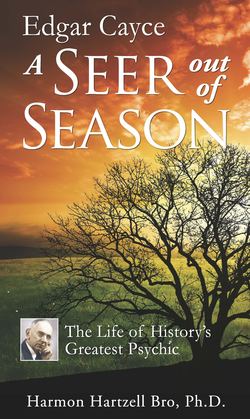Читать книгу Edgar Cayce A Seer Out of Season - Harmon Hartzell Bro - Страница 15
На сайте Литреса книга снята с продажи.
Taking On Cayce in Person
ОглавлениеIf Cayce were not a crook and not a mental case, if he were not a promoter and not a self-appointed messiah, then his efforts might be a huge adventure to explore. When he wrote to my mother that he really needed help (now that both his sons were in the Army) and asked whether I might be interested in working with him for a year, I thought carefully about it.
Would it be proper to go down this strange path in the midst of a brutal war that had already taken the lives of some of my classmates? My draft board had given me a 4-D rating of exemption for study in theology, and I took this privilege very seriously; already I had been to the Navy recruiting office to discover the requirements for the chaplaincy when I completed the needed years of graduate study. The draft authorities indicated that I could take a year for field research, so long as the effort was clearly tied to graduate studies. I outlined a plan to interview not only Cayce but dozens of his associates and those who sought his counsel, collecting data for a later doctoral dissertation. My father thought the design would be sound in his academic circles, and the university assured me that I would not lose my degree track.
It seemed unlikely that someone more authoritative than I, from Chicago or any other university, would get around to investigating Cayce soon. This was wartime. Posters cried out for victory from bulletin boards in gray academic buildings just as loudly as they did from store windows and subway platforms. Platoons of soldiers, airmen, and sailors in distinctive uniforms marched briskly between classes among the stately campus towers. They carried textbooks, not weapons, because this was the Midwest, and invasion was so far unlikely—unless England collapsed under the ceaseless airborne Blitz by the Germans. But the drilling groups swinging their wooden rifles to sharp commands shouted on the Midway made clear that combat was a universal destination. Small lines of troops stepped smartly past libraries that held the treasures of centuries, and past the subdued dark-wood classrooms with arched Gothic windows where Robert Maynard Hutchins as president (and my friend since high school) had led the movement to study classics he called Great Books in a thinking man’s university. It was a time to bend wisdom to technique, to make learning serve conquest. The university did its part, even to opening the atomic husk that would one day release a blinding flash and a mushroom cloud.
My task would be to ask the right questions about Cayce, illuminating the productive potentials of his gift and suggesting how far it might be replicated. Otherwise I would be abandoning my post in a painful time of history, not only in the Manhattan Project, where I would scarcely be missed, but in the hard inner demand on our generation to unscramble a devastated world. I looked on the potential assignment with great seriousness. The gold stars that hung mutely on little cloth squares in windows on many a nearby block, signifying a military death in that family, demanded no less.
Friends posed tough questions, as graduate students should. If Cayce were real, why wasn’t he rich and famous? Why wasn’t he already being used in Washington for the war effort? Why had the Cayce Hospital failed, as did the fledgling but respectable Atlantic University built on his work, with such guidance at hand? How would such a gift—if truly there—ever make mistakes? Surely there was a catch in the story somewhere. Perhaps he had developed some sort of cult, to which the author of his biography belonged. Wouldn’t it destroy one’s perspective and balance to move into his orbit? Better, they said, just to read about him and wait for someone to expose him.
In particular they hammered at the one area where Cayce seemed most vulnerable. It was reincarnation. Midway in his adult life, after twenty-some years of winning increasing respect for his medical counsel, he had been stunned to hear his trusted trances present a view of human psychology and destiny that included being reborn on earth over and over. Many church friends had backed away from him. Physicians consulted him more guardedly.
One might suspend judgment about his capacity to retrieve verifiable information and make sound judgments about medical targets. But to consider that Cayce might be correct about reincarnation required challenging all the major thinkers of Western civilization—except Plato and Origen. If Cayce were correct, then what of the great parade of philosophers and theologians who had given their lives to studying the human condition but had not seen reincarnation as part of it? What of Augustine and Aquinas, Luther and Calvin, Spinoza and Kant, not to mention Darwin, Marx, and Freud? To question all these minds was like blowing up our campus. Only a fanatical empiricist, it seemed, would start fresh in such an investigation when there was so much else important to study in a world at war. If Cayce were right, then large portions of the Orient had been correct all along in their Hindu and Buddhist perspectives. Who knows where this might lead? Were we not at war with the Buddhist country of Japan? Shouldn’t that reveal something about their understanding of ultimate reality? (That we were also at war with Germany, the cradle of modern philosophy and theology, and the source of much of the greatest in Western music and poetry, did not come up as readily.) Surely if Cayce’s work were tragically flawed on reincarnation, it must be flawed in other areas. No wonder it had not been more studied.
